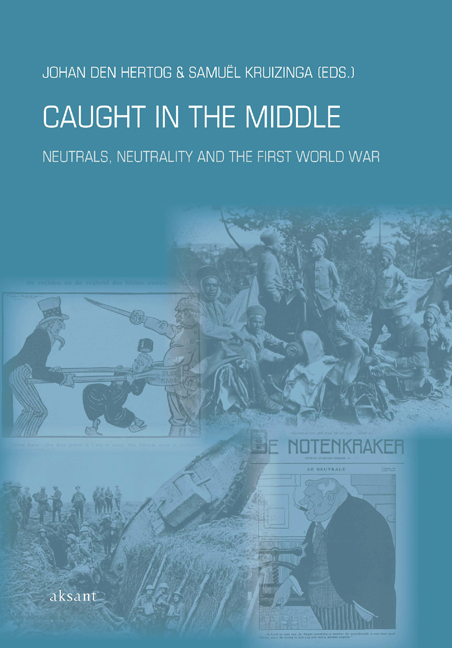Book contents
- Frontmatter
- Contents
- Acknowledgements
- Chapter 1 Introduction
- Chapter 2 Dutch Neutrality and the Value of Legal Argumentation
- Chapter 3 ‘Upon the Neutral Rests the Trusteeship of International Law’: Legal advisers and American unneutrality
- Chapter 4 Spanish Neutrality During the First World War
- Chapter 5 Britain’s Global War and Argentine Neutrality
- Chapter 6 NOT Neutrality: The Dutch government, the Netherlands Oversea Trust Company, and the Entente blockade of Germany, 1914-1918
- Chapter 7 From Parasite to Angel: Narratives of neutrality in the Swedish popular press during the First World War
- Chapter 8 Colour-blind or Clear-sighted Neutrality?: Georg Brandes and the First World War
- Chapter 9 The Hottest Places in Hell?: Finnish and Nordic neutrality from the perspective of French foreign policy, 1900-1940
- Chapter 10 The Other End of Neutrality: The First World War, the League of Nations, and Danish neutrality
- About the Contributors
Chapter 2 - Dutch Neutrality and the Value of Legal Argumentation
Published online by Cambridge University Press: 28 January 2021
- Frontmatter
- Contents
- Acknowledgements
- Chapter 1 Introduction
- Chapter 2 Dutch Neutrality and the Value of Legal Argumentation
- Chapter 3 ‘Upon the Neutral Rests the Trusteeship of International Law’: Legal advisers and American unneutrality
- Chapter 4 Spanish Neutrality During the First World War
- Chapter 5 Britain’s Global War and Argentine Neutrality
- Chapter 6 NOT Neutrality: The Dutch government, the Netherlands Oversea Trust Company, and the Entente blockade of Germany, 1914-1918
- Chapter 7 From Parasite to Angel: Narratives of neutrality in the Swedish popular press during the First World War
- Chapter 8 Colour-blind or Clear-sighted Neutrality?: Georg Brandes and the First World War
- Chapter 9 The Hottest Places in Hell?: Finnish and Nordic neutrality from the perspective of French foreign policy, 1900-1940
- Chapter 10 The Other End of Neutrality: The First World War, the League of Nations, and Danish neutrality
- About the Contributors
Summary
Soon after the outbreak of the Great War, neutral countries experienced the sudden collapse of the rights and duties which had, before the horrors of war shattered peacetime status quo, been accorded them. In the last few pre-war years, these rights and duties had been carefully codified into law. Especially during the Hague Peace Conference of 1907 and the Declaration of London on maritime rights of 1909, the international community had worked hard to codify the rights and duties of neutrals. Because it was deemed of paramount importance by all participating nations, this development in international law aroused a great deal of debate. Only at the outbreak of war did these well-meaning attempts to stabilize the world via an international legal code collapse.
Even though the House of Lords rejected the Declaration of London in 1911, the British government still worked at getting it ratified. After Britain joined the war against the Central Powers, however, the British Government came to realize that it would be advisable to determine which parts of the international code it could adhere to without limiting its capacity to fight the enemy. This was especially salient with regard to Britain's relation with the European neutrals, who insisted on their established right to trade with whomever they wished. The Allies not only wanted to block all transit traffic to Germany, they also wanted a substantial share of neutral products, especially potatoes, fish and dairy products, for low prices. In addition, they wanted to prevent export of indigenous neutral produce to Germany. The Germans, on the other hand, for exactly the same reason – preventing products reaching the enemy – launched their U-boat-campaign in 1915, thus threatening the lives of neutral sailors. These were severe infringements on the carefully described rights of neutrals as codified in 1907 and 1909.
These infringements on the agreed rights of neutrals brought the historian Nils Ørvik to the conclusion that World War One spelled the end of neutrality. He dismissed the system of international law created before the war as a ‘sky-high artificial structure,’ devoid of real-world meaning. To this he added his vision that neutral countries relying on this structure of international law, and thus counting on a legal status as a neutral, made themselves dependent upon ‘absolute nonparticipation and passivity.’
- Type
- Chapter
- Information
- Caught in the MiddleNeutrals, Neutrality and the First World War, pp. 15 - 34Publisher: Amsterdam University PressPrint publication year: 2012



